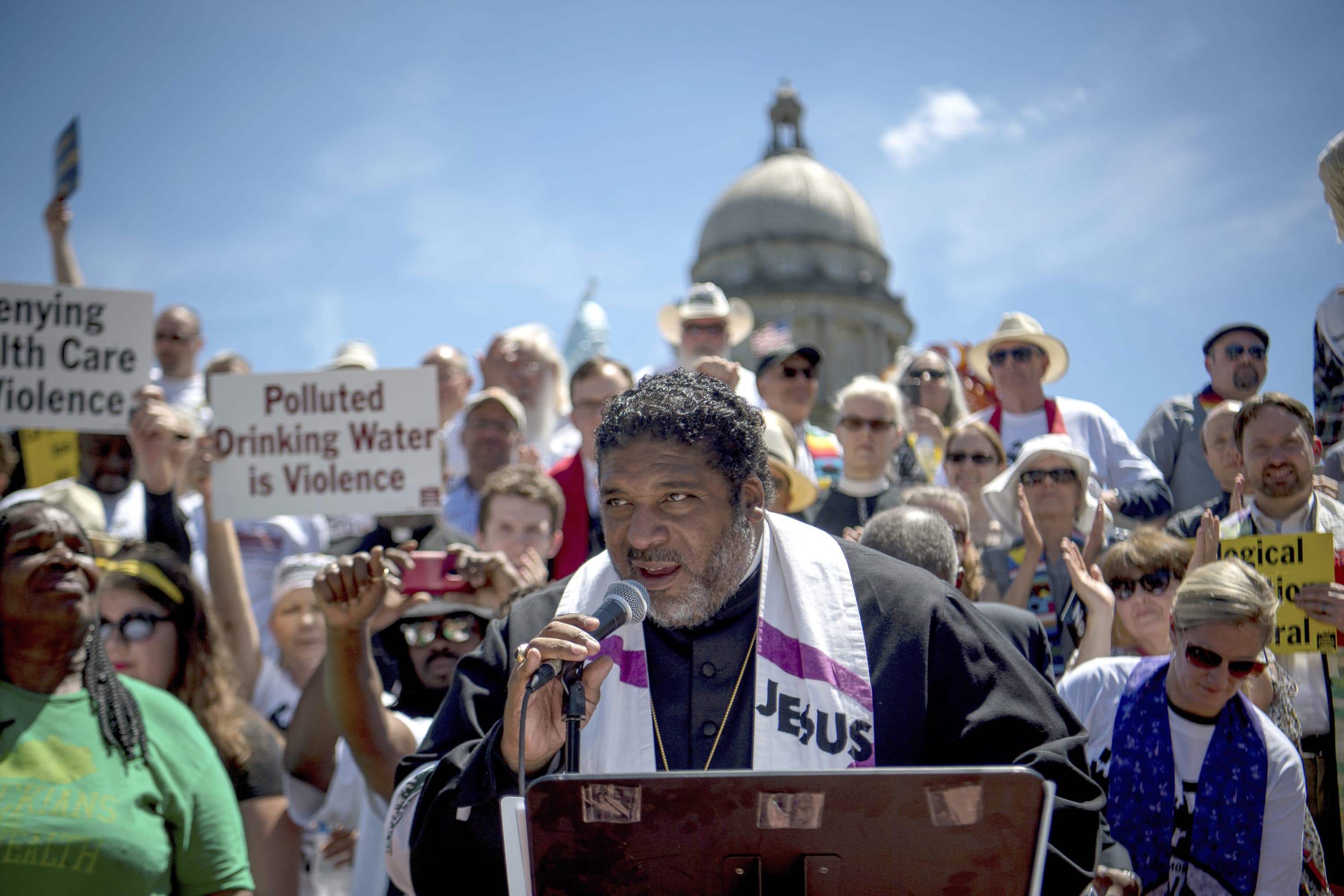Advertisement
Rev. William Barber Calls For Restructuring U.S. Policies To Root Out Racism, Poverty
Resume
There are two times in U.S. history when the government saw the mistreatment of Black Americans as something we could no longer tolerate: The First Reconstruction followed the Civil War and the Second Reconstruction was the Civil Rights movement.
For years, Rev. William Barber has been calling for a Third Reconstruction — a sweeping effort from the federal government to dismantle racist policies and structures — to reimagine American society for the betterment of us all. This idea has gained traction over the last year.
Barber is co-chair of the Poor People’s Campaign, president of Repairers of the Breach, and author of the book "The Third Reconstruction: How a Moral Movement is Overcoming the Politics of Division and Fear."
In his work, Barber once posed the question, “what is the cost of inequality?” In the U.S., 140 million people live in poverty — 43% of the nation’s population, according to the Poor People’s Campaign.
Barber believes there's not a scarcity of resources, but a scarcity of political consciousness. The U.S. has the capacity to give Americans health insurance, for example, which would give the country a boost, he says.
“We know every time corporations want money, they get the tax cut,” he says. “But poor and low wealth people get the short end of the stick and it's hurting this nation.”
This transformation requires more than a single bill, agenda or political power, though some elements of what Barber pushes for are included in the Biden administration’s most recent measures taking on systemic ills.
The Poor People Campaign brought 35 people — poor and low wealth folks, public health experts, environmentalists, economists, lawyers — to meet with Biden’s policy team before the inauguration, Barber says. The group laid out a 14 point plan on establishing justice in order to heal the nation.
“Number one, we need living wages,” he says. “We need health care for all. We need infrastructure that's targeted toward poor and low wealth communities and infrastructure that addresses climate change. We said we needed restoration of the Voting Rights Act.”
Barber is glad to see some of these asks moving forward but questions remain about pushing these policies all the way through. And the campaign doesn’t think the dollar amount in Biden’s infrastructure bill is enough.
Barber is working with Democratic Reps. Pramila Jayapal and Barbara Lee to pass a resolution that would realize at least one goal of the Third Reconstruction — ending poverty in the U.S.
The bill explains how to end poverty and why making these investments will benefit the nation in the long run even if it means some deficit spending now, he says. The plan to fully address poverty includes a living wage, universal health care, permanent earned income and child tax credits.
Barber pushed Walmart to embrace an Employee Safety and Wages Initiative. But the company voted against the plan, saying it already has proper health protocols and offers workers two weeks paid leave for COVID-19 related reasons.
Walmart’s decision shows why the country needs reconstruction and policy shifts, he says. He believes corporations should pay workers living wages and provide health care because it’s the right thing to do, both economically and morally, but federal laws are needed to ensure compliance.
He recalls the words of Dr. Martin Luther King Jr.: “It may be true that the law cannot make a man love me, but it can keep him from lynching me, and I think that’s pretty important also.”
One major part of all of this is the need for bipartisan support in a divided nation. The division stems from, as King said, the ruling class’s fear of poor people of all races joining together and using their voting power to change the “economic architecture of this nation, Barber says.
A study with Columbia University showed that new low-income voters could flip election results in 15 states.
In his recent op-ed in The New York Times, Barber reminds us that the generation of kids who watched the case of the shooting death of Trayvon Martin in 2012 are now adults who are mobilizing this week, which marks the anniversary of the Tulsa Race Massacre.
The U.S. can’t wait 20 years for this next reconstruction, he says, because our democracy will “implode” without it.
The solution starts at the state level and requires building multiracial coalitions, he says.
“You can't have coalitions of Black folks over here fight for voting rights, white people over here fighting against environmental injustice. They all intersect,” he says. “And we must deal with interlocking injustices with an intersectional moral fusion coalition.”
And Barber believes the coalition is forming. The Poor People’s Campaign had to make its planned march on Washington virtual last June because of COVID-19 — and 2.7 million people tuned in to join the fight, he says.
“But it can't be too long because if we don't get a handle on the issues of systemic racism, systemic poverty, ecological devastation, denial of health care and this false moral narrative of white supremacy and religious nationalism, it will undermine this democracy in ways that may not be able to be fixed,” he says. “The reconstruction must be now.”
Ciku Theuri produced and edited this interview for broadcast with Jill Ryan. Allison Hagan adapted it for the web.
This segment aired on June 4, 2021.

